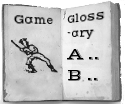Box Baseball: Difference between revisions
(Set Game Eras to Derivative) |
No edit summary |
||
| Line 2: | Line 2: | ||
|Term=Box Baseball | |Term=Box Baseball | ||
|Game Family=Fungo | |Game Family=Fungo | ||
| | |Game Regions=US | ||
|Game Eras=Derivative | |Game Eras=Derivative | ||
|Invented Game=No | |||
|Description=<p>[A] per Bronner [1997]. Using three sidewalk squares, a “pitcher” throws the ball into the box closest to his opponent, who tries to slap the ball into the box closest to the pitcher. If he missed the box or the pitcher catches ball on the fly, it is an out. There is no baserunning. Also called “Boxball.”</p> | |||
<p>[B] New York City streets are composed on concrete squares approximately [X?] feet square. Players would be separated by three squares. They would alternate pitcher/catcher and hitter depending on who was up. The pitcher had to have the ball bounce in the box closest to the batter. The pitcher would place the ball and fluke it in order to make it difficult to hit after the bounce. The batter was required to slap the ball so that it landed in the box closest tot he pitcher. If the pitcher caught the ball on a fly, it was an out. One bounce was a single, two a double, etc, The batter would try to hit the ball low and fast in order to get it past the pitcher.</p> | |||
<p> </p> | |||
<p> </p> | |||
|Sources=<p><span>Simon J. Bronner, "Concrete Folklore: Sidewalk Box Games," </span><em>Western Folklore</em><span> 36, no. 2 </span>(1977)<span>., page 172.</span></p> | |||
<p><span>[B] Communication from Neal Seldman and Mark Schoenberg.</span></p> | |||
<p><span> </span></p> | |||
|Has Supplemental Text=No | |||
}} | }} | ||
Latest revision as of 07:34, 18 September 2017
| Game | Box Baseball |
|---|---|
| Game Family | Fungo |
| Location | |
| Regions | US |
| Eras | Derivative |
| Invented | No |
| Tags | |
| Description | [A] per Bronner [1997]. Using three sidewalk squares, a “pitcher” throws the ball into the box closest to his opponent, who tries to slap the ball into the box closest to the pitcher. If he missed the box or the pitcher catches ball on the fly, it is an out. There is no baserunning. Also called “Boxball.” [B] New York City streets are composed on concrete squares approximately [X?] feet square. Players would be separated by three squares. They would alternate pitcher/catcher and hitter depending on who was up. The pitcher had to have the ball bounce in the box closest to the batter. The pitcher would place the ball and fluke it in order to make it difficult to hit after the bounce. The batter was required to slap the ball so that it landed in the box closest tot he pitcher. If the pitcher caught the ball on a fly, it was an out. One bounce was a single, two a double, etc, The batter would try to hit the ball low and fast in order to get it past the pitcher.
|
| Sources | Simon J. Bronner, "Concrete Folklore: Sidewalk Box Games," Western Folklore 36, no. 2 (1977)., page 172. [B] Communication from Neal Seldman and Mark Schoenberg.
|
| Source Image | [[Image:|left|thumb]] |
| Comment | Edit with form to add a comment |
| Query | Edit with form to add a query |
| Has Supplemental Text |
Comments
<comments voting="Plus" />
